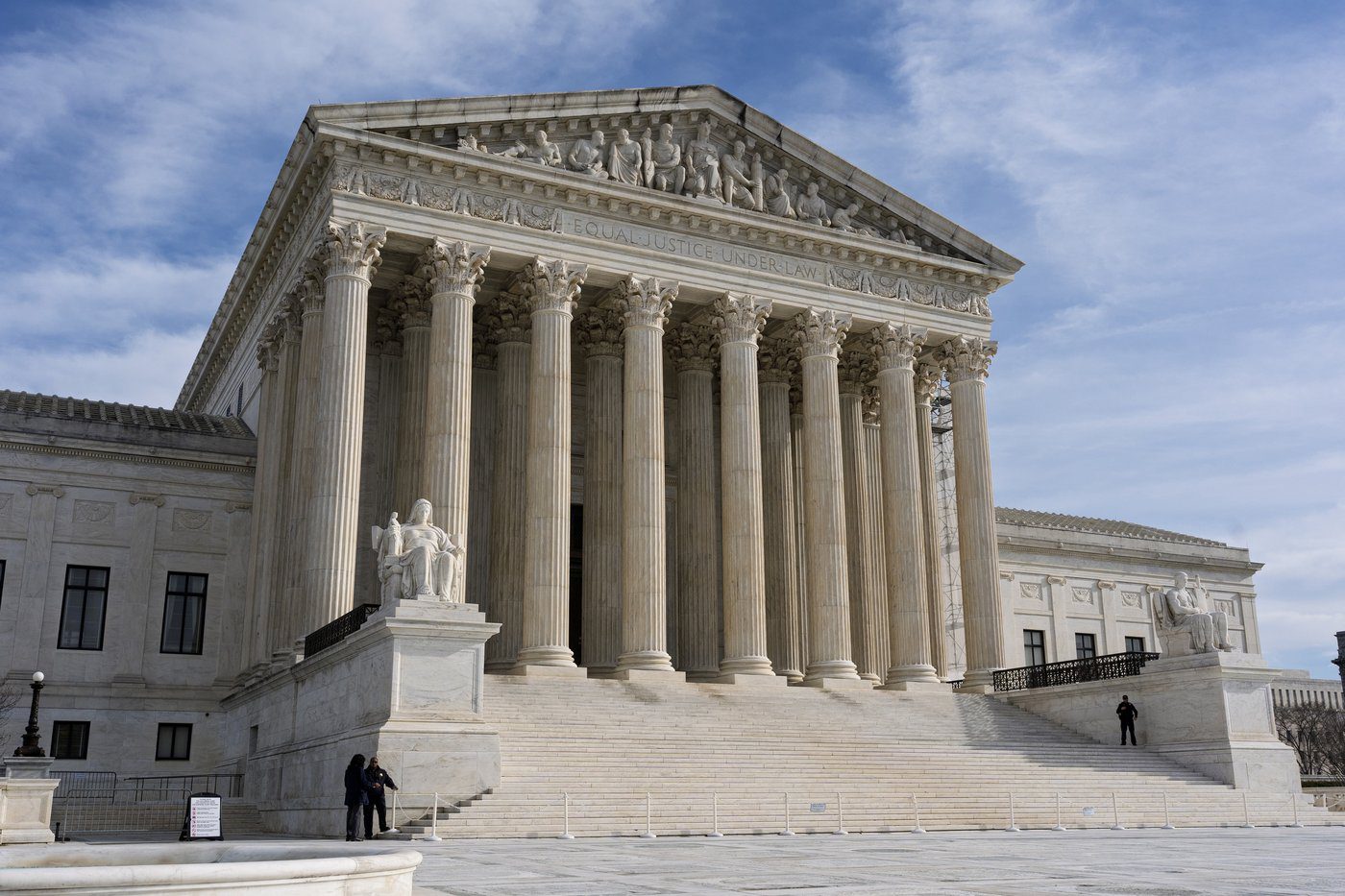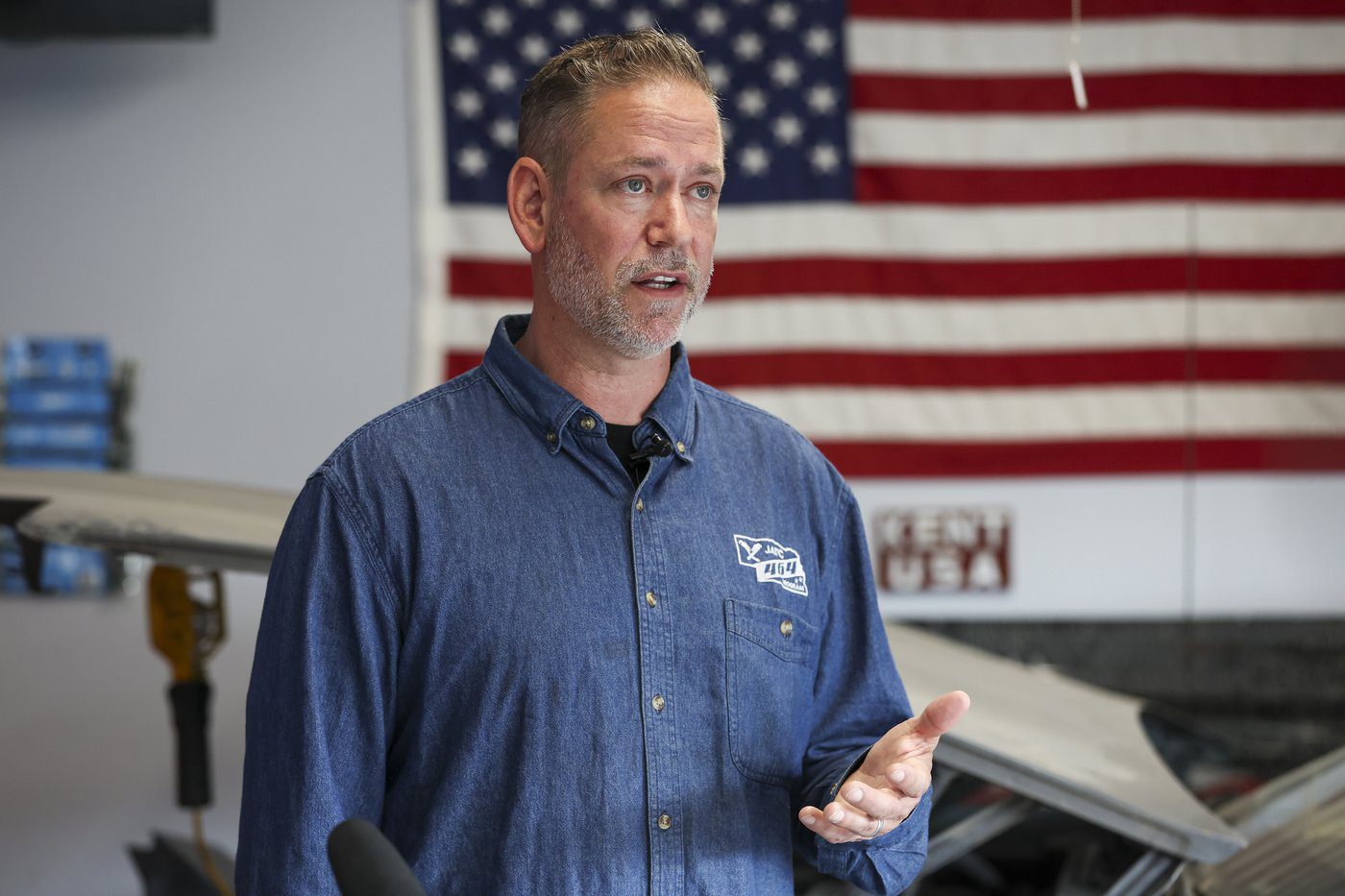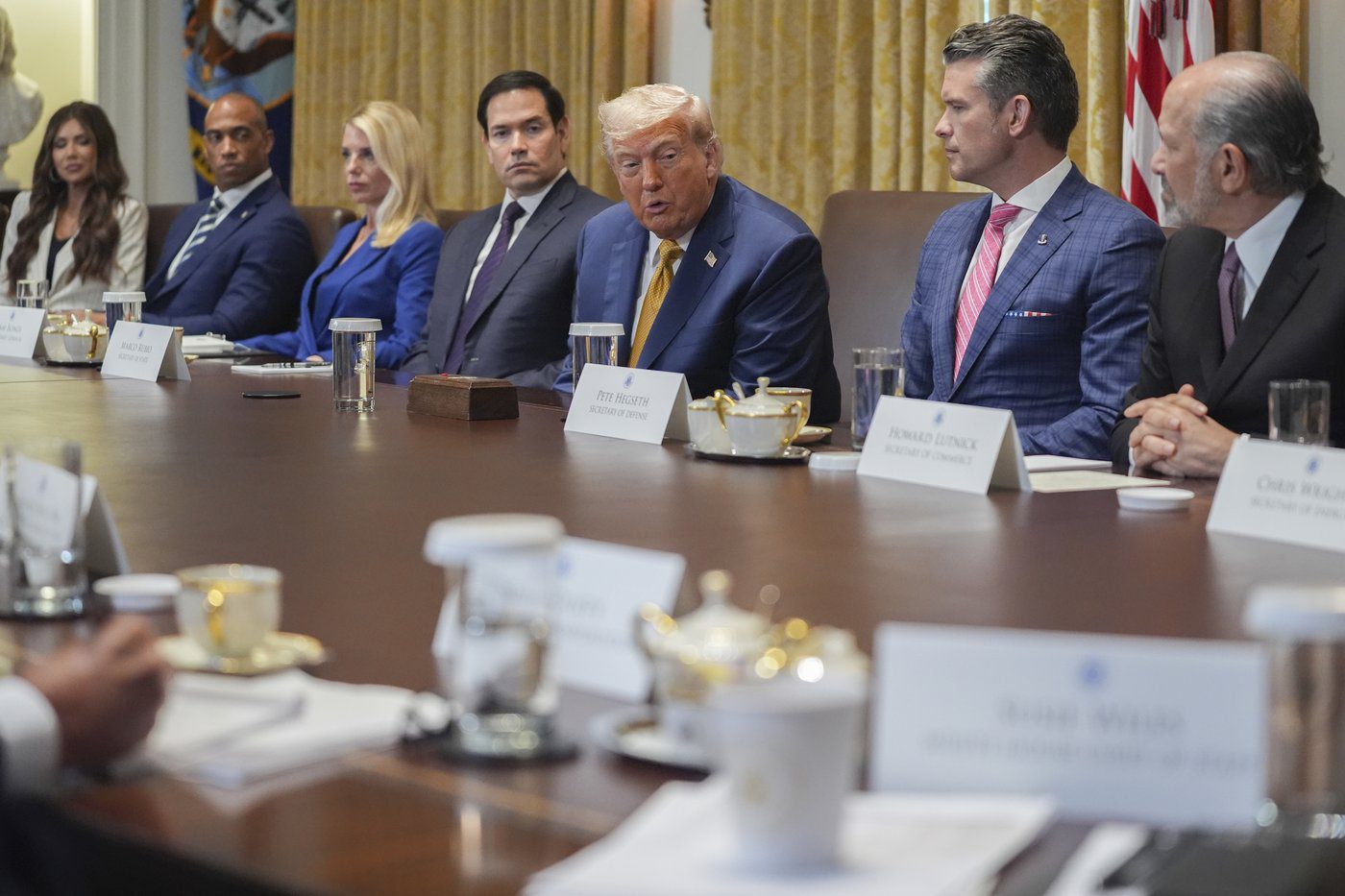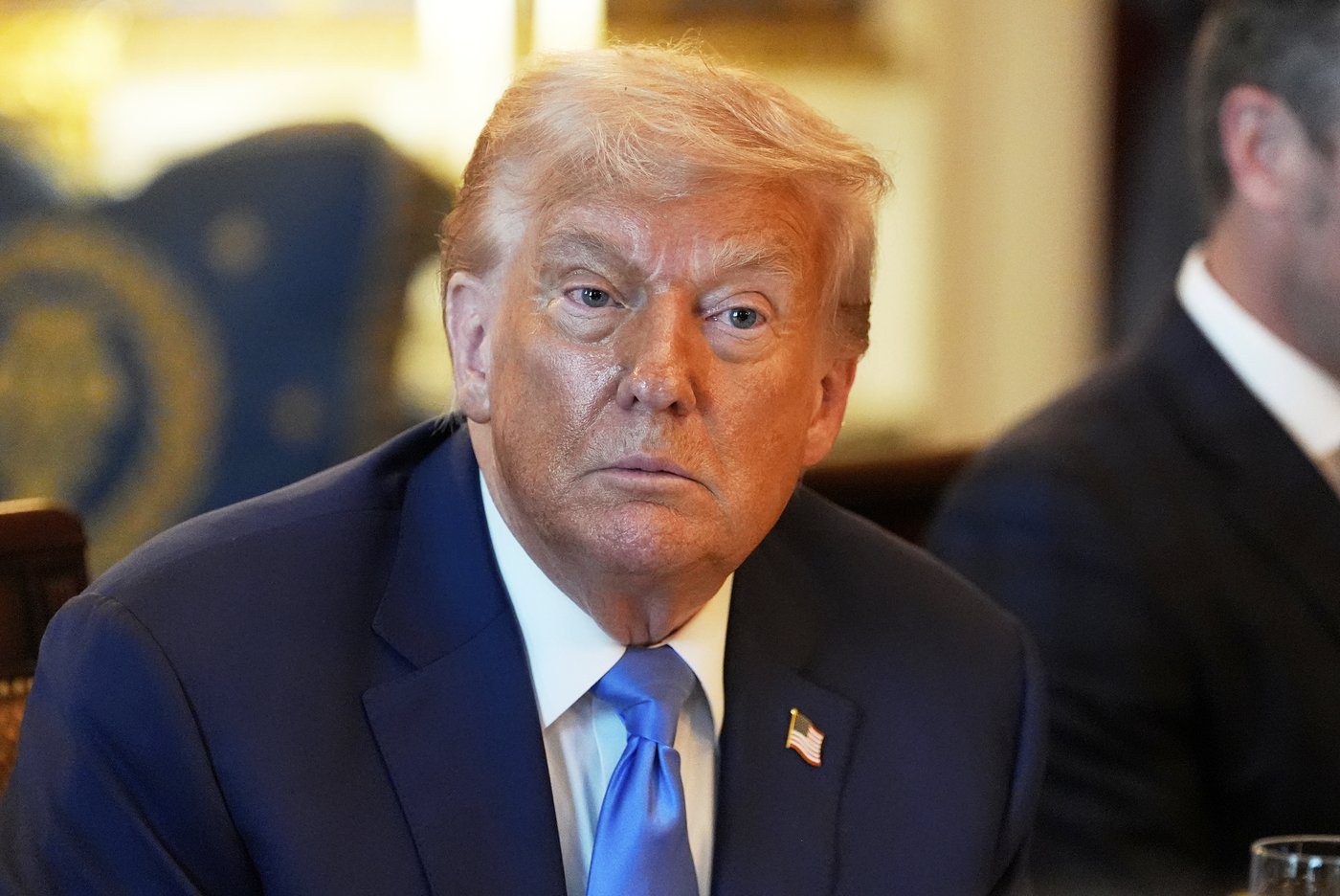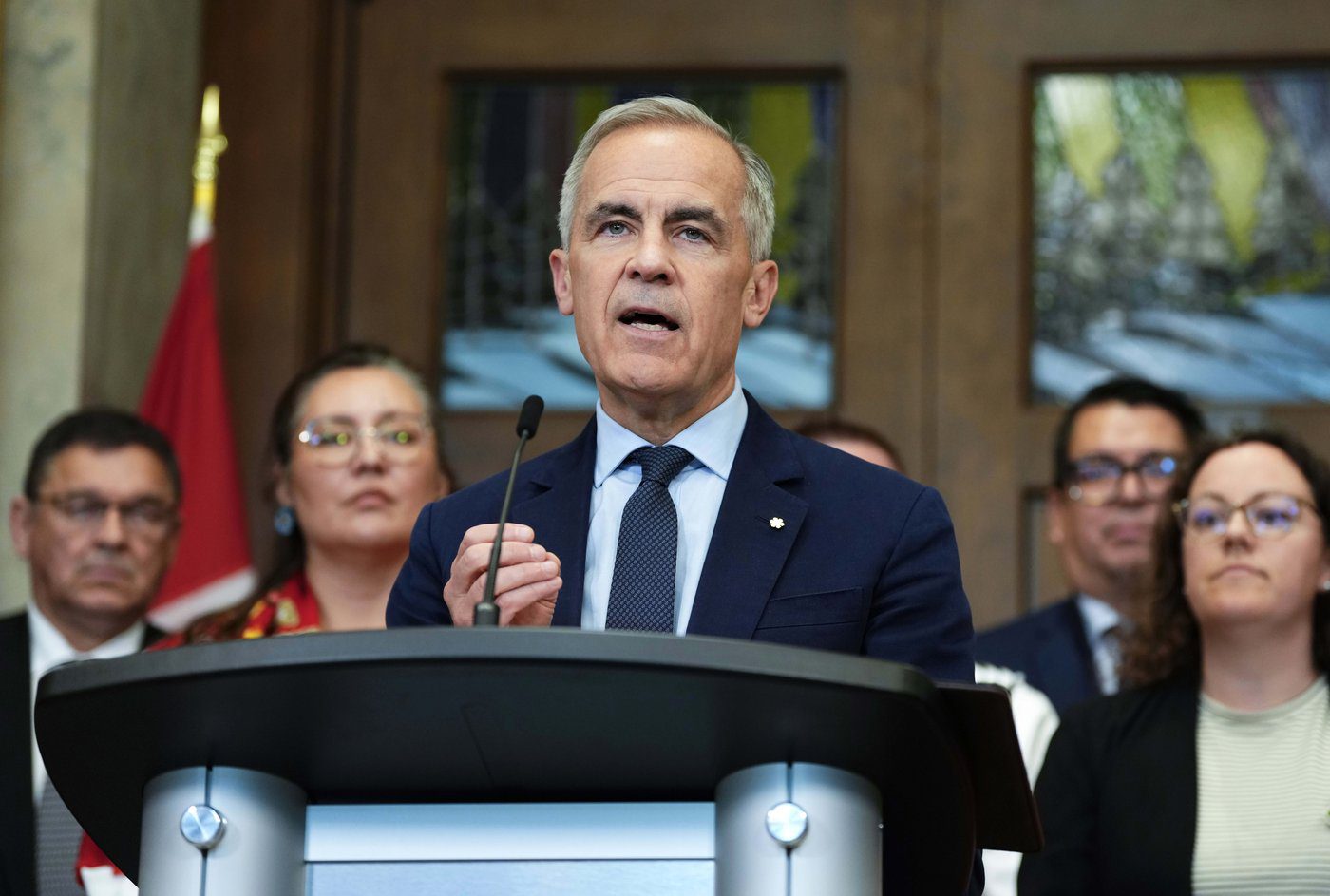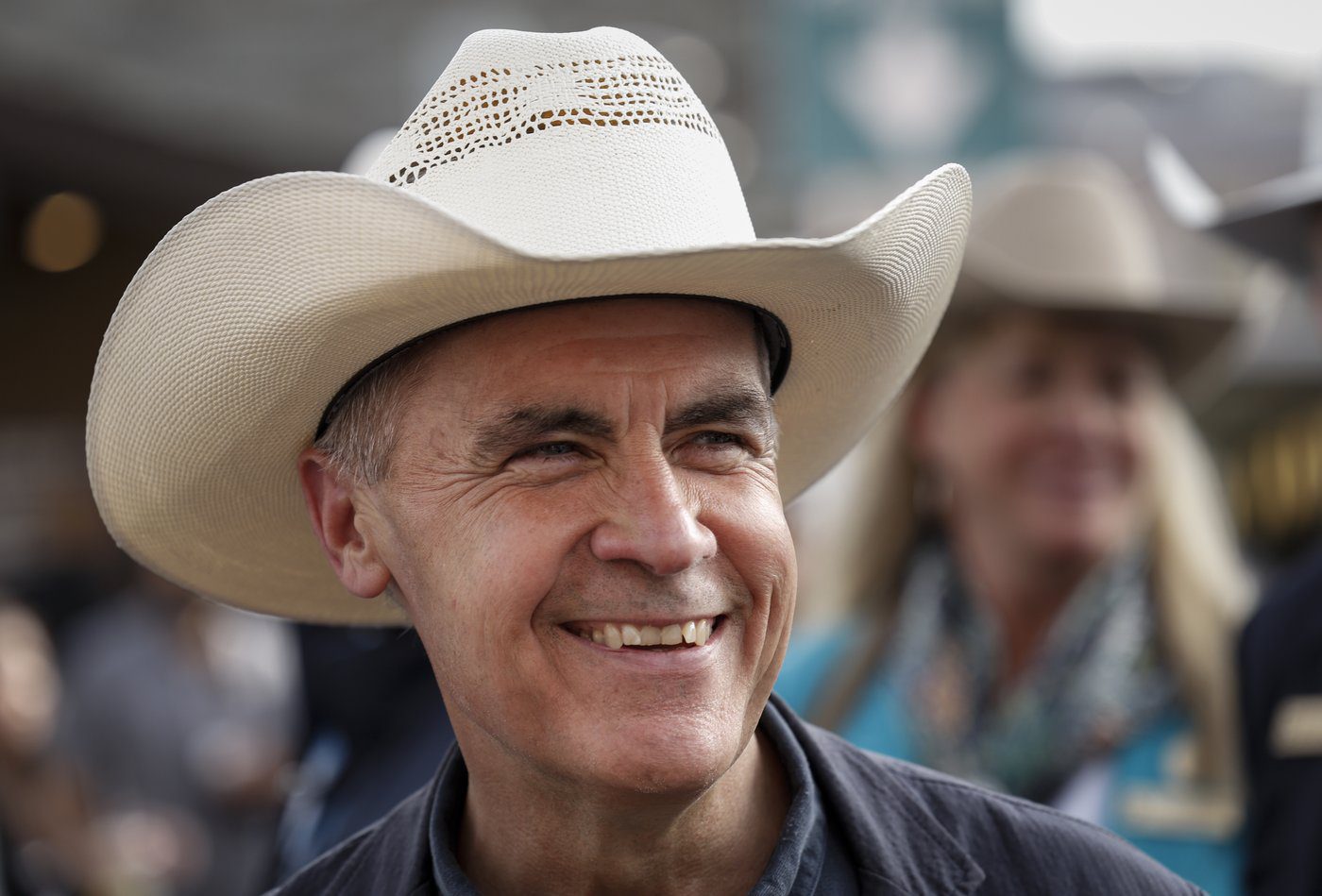President Donald Trump said Israeli Prime Minister Benjamin Netanyahu will be back at the White House on Tuesday to meet with him. Netanyahu’s office confirmed the two will meet at 4:30 p.m. ET. Earlier, Netanyahu told reporters in the Capitol that the two see “eye to eye” on the issue of destroying Hamas and added that the cooperation and coordination between Israel and the United States is currently the best it has ever been during Israel’s 77-year-history.
The president held his Cabinet meeting in made-for-TV fashion, gathering top officials to showcase their recent actions and take questions from the press. The session lasted 1 hour and 45 minutes. That’s long, but not as long as his last one, which ran a full 2 hours.
Trump plans a Friday visit to Texas, where flash floods killed more than 100 people, raising questions about whether more people will suffer due to his cuts to the National Weather Service and Federal Emergency Management Agency.
The Latest:
Trump caught off guard by Pentagon’s abrupt move to pause Ukraine weapons deliveries, AP sources say
President Donald Trump’s decision to send more defensive weapons to Ukraine came after he privately expressed frustration with Pentagon officials for announcing a pause in some deliveries last week — a move that he felt wasn’t properly coordinated with the White House, according to three people familiar with the matter.
The Pentagon, which announced last week that it would hold back some air defense missiles, precision-guided artillery and other weapons pledged to Ukraine because of what U.S. officials said were concerns that American stockpiles were in short supply. Trump said Monday that the U.S. will have to send more weapons to Ukraine, effectively reversing the move.
Two of the people, who spoke on the condition of anonymity about the sensitive internal discussions, said there was some internal opposition among Pentagon brass to the pause — coordinated by Pentagon policy chief Elbridge Colby — before it was announced.
One of the people described Trump as being caught “flat-footed” by the announcement.
Trump says his administration can protect the farm workforce without offering migrants ‘amnesty’
During his Cabinet meeting, Trump said his administration is “doing a work program” that will allow migrants from abroad working on farms to remain in the U.S., but that it won’t qualify as “amnesty.”
Agriculture Secretary Brooke Rollins then spoke up, saying that Trump’s broader crackdown on immigration means that “mass deportation continues, but in a strategic way” and that officials can keep “ensuring that our farmers have the labor that they need.”
She said officials would promote automation and growing the agricultural workforce using U.S. citizens. Trump then interrupted her to add, “We’ve gotta give the farmers the workers they need, but we’re not talking amnesty.”
Trump wraps up marathon meeting
The session with Cabinet officials lasted 1 hour and 45 minutes.
That’s long — but not as long as his last Cabinet meeting, which ran a full 2 hours.
Trump meeting with Netanyahu moved up
Israeli Prime Minister Benjamin Netanyahu said the meeting with Trump has been pushed forward to 4:30 p.m., rather than 6 p.m.
Earlier, Netanyahu told reporters in the Capitol that the two see “eye to eye” on the issue of destroying Hamas and added that the cooperation and coordination between Israel and the United States is currently the best it has ever been during Israel’s 77-year-history.
Trump talks decorating
During a Cabinet meeting, the president took a detour to talk about how he’s updated the furnishings around the White House.
“It’s really become quite a beautiful place.”
He talked about choosing paint colors and deciding whether to add more gold accents. He also pointed at the portraits of historical presidents on the walls, lingering on the ornamental frames.
“I’m a frame person. Sometimes I like the frames more than I like the pictures.”
Trump also said he relocated a grandfather clock from the State Department to the White House, drawing a laugh from Secretary of State Marco Rubio, who was sitting to his right.
“If I see anything that I like, I’m allowed to take it,” Trump said.
Vance says he was ‘skeptical’ they could get Trump’s legislation passed on time
Sitting across from Trump, the vice president admitted something — “I never told you this, but I was skeptical we would be able to get this thing done by July 4th.”
He congratulated the White House staff for working together so well.
Trump said it was important to have everything combined in one piece of legislation, including tax cuts, border security and other proposals.
“It had something for everyone,” Trump said
Trump says he’s staying out of upcoming New York City mayoral election
Asked how Republicans should vote in November, Trump said, “I’m not getting involved.”
But that was after he criticized the Democratic nominee, Zohran Mamdani as a “disaster” who has sold New Yorkers a “good line of bull—-.”
He said Curtis Sliwa, the Republican candidate, “runs every four years” and noted that Eric Adams is the current officeholder. Adams, a Democrat, is running as an independent.
Trump also threatened a federal takeover of New York City if Mamdani were to be elected.
Trump says he and Netanyahu will meet again Tuesday
Trump said Israeli Prime Minister Benjamin Netanyahu will be back at the White House on Tuesday to meet with him.
“He’s coming over later,” Trump said at midday during a Cabinet meeting.
The leaders met over dinner on Monday night as Trump looks to push Israel and Hamas militants into ending their war in Gaza.
Trump also complained that Netanyahu was being treated “unfairly” by his government. That was a reference to the prime minister’s corruption trial.
Netanyahu praises American-Israeli relations, says ‘closer on hostage’ deal
Netanyahu said that Israeli troops “fought like lions” in military strikes on Iran and thanked American support.
The Israeli prime minister added that throughout Israel’s history there has “never been the degree of coordination, of cooperation and trust between America and Israel as we have today.”
He added that “it may be very likely” that he and Trump will meet again during his next trip. “This is having a great change in our region. There are opportunities for peace that we intend to realize. We’re working together on this,” Netanyahu said.
The prime minister said Israel was “closer” to a ceasefire deal with Hamas but declined to offer details about talks. “We’re certainly working on it,” Netanyahu said of a ceasefire deal and negotiations to free Israeli hostages in Gaza.
He continued that talks “need several parties, but we’re working on it diligently as we speak.”
“We have still to finish the job in Gaza, release all the hostages, eliminate and destroy Hamas’ military and governance capabilities, because Gaza must have a different future for our sake, or everything’s sake, and no country will settle for less,” said Netanyahu.
When asked whether he’d welcome congressional approval of more advanced bombers to Israel, Netanyahu declined to discuss his talks with Johnson but said: “Yeah, of course we’d like it, who wouldn’t want it?”
Trump says he’s putting a 50% tax on copper imports, possibly 200% on pharmaceutical drugs
Trump said that he will sign an order on Tuesday placing a 50% tariff on copper.
That import tax would match the rates charged on steel and aluminum, likely increasing the price of metals in the United States. Trump has defended the tariffs as helping to create factory jobs, though manufacturers have shed jobs so far during his presidency.
Trump also said he would be announcing tariffs on pharmaceutical drugs at a “very, very high rate, like 200%.”
Trump doubles down on his dislike of wind as an energy source
He says it’s an expensive form of energy and that windmills and wind farms are “very bad for beautiful surroundings.”
Trump also said this source of energy is inefficient because wind is intermittent.
“We need the kind of things that’s going to fire up our plants and it’s not going to be wind,” he said, referring to coal.
The president said “smart” countries don’t use wind and solar energy and that the U.S. is “brilliant.”
Trump says he talks ‘often’ with China’s leader
President Donald Trump told reporters at Tuesday’s cabinet meeting that he frequently talks with Chinese President Xi Jinping and they have a good relationship.
“We speak often,′ Trump said.
It was unclear what “often” meant, but the two leaders had a 90-minute call in June.
Trump says some countries’ imports will be tariffed at 70%
Trump defended his setting of tariff rates by sending letters to other world leaders, saying that “some” countries will be paying rates of 60% and 70%.
Trump sent letters to the leaders of 14 countries on Monday, many of the rates being much lower than what he floated was possible at Tuesday’s cabinet meeting.
He defended the decision to send letters as part of his 90-day negotiating period drawing to a close because he couldn’t conduct talks with all of the countries in the rest of the world.
“It’s a better way,” Trump said. “It’s a more powerful way. And we send you a letter. You read the letter. I think it was well crafted.”
Trump comes to defense of Bondi amid scrutiny over Epstein files
President Donald Trump has leapt to the defense of Attorney General Pam Bondi amid fresh scrutiny from elements of his base over recent Justice Department revelations in the Jeffrey Epstein sex trafficking investigation.
Trump headed off a reporter’s Epstein-related questions for Bondi at a Cabinet meeting, chiding the journalist for asking “about a guy who’s been talked about for years” and suggesting the interest in the subject was a “desecration” at a time when the country was grappling with issues like the catastrophic Texas flooding.
The president’s response appeared to signal his continued support for Bondi even as she faces questions over the Justice Department’s acknowledgment in a memo on Monday that Epstein did not maintain a “client list.”
Bondi had previously suggested in a Fox News interview that a client list was “sitting on my desk” for review, but the attorney general said Tuesday that she was referring to the Epstein case file in general as being on her desk.
Trump says he will defend US dollar as world’s dominant currency
Trump says he’s prepared to tariff and punish countries that challenge the U.S. dollar as the global reserve currency.
Speaking at Tuesday’s cabinet meeting, Trump said that the dollar losing its status “would be like losing a war, a major world war. We would not be the same country any longer. And we’re not going to let that happen.”
Trump made his comments after emphasizing his plan to put a 10% tariff on countries in the BRICS organization that have discussed creating alternatives to the dollar.
“I’m just saying, if people want to challenge it, they can, but they’re going to have to pay a big price,” Trump said. “And I don’t think any of them are willing to pay that price.”
Trump says he’s open to a congressional investigation of Federal Reserve chair
President Donald Trump said he would be OK with congress investigating Federal Reserve Chair Jerome Powell, saying, “I think he’s terrible.”
Trump was answering a reporter’s question at a Cabinet meeting on Tuesday about whether the head of the U.S. central bank should be investigated for lying to Congress.
Trump has been calling on Powell to slash benchmark interest rates because inflation has eased. Powell has held off on rate reductions until the impact of Trump’s tariffs are understood.
Trump said he thinks Powell “should resign immediately.”
Trump again says he’s not happy with Putin
The president said during his Cabinet meeting that the Russian leader is “killing a lot of people” and a lot of them are his soldiers and Ukraine’s soldiers.
Trump was asked whether he was planning to do something about Putin, and he said, “I wouldn’t be telling you.”
“It’s turned out to be tougher,” he said as he spoke about the war.
Hegseth says Iran bombing reversed ‘debacle’ of U.S. Afghanistan withdrawal
Defense Secretary Pete Hegseth is suggesting that the U.S. bombing of Iran restored America’s reputation of military might on the world stage.
Hegseth said the bombings “reversed what happened in Afghanistan. You saw the debacle of what Biden allowed to happen in Afghanistan, and what that did to our image.” By contrast, he said Trump’s ordering of the attack on Iran meant “reestablishing American leadership and deterrence.”
That was a reference to the chaotic U.S. military withdrawal from Afghanistan under President Joe Biden in 2021. Trump called what happened then the “most botched up mess I’ve ever seen.”
Noem gives emotional account of visiting Texas after deadly flooding
Homeland Security Secretary Kristi Noem, has recounted leading federal response to the devastating flooding in Texas, telling Trump’s Cabinet meeting that she was overcome with emotion during the trip and had “kind of fallen apart.”
“Very emotional, but also just so tragic,” she said.
Noem said “Texas is strong” but also insisted, “We, as a federal government, don’t manage these disasters. The state does.”
“We’re cutting through the paperwork of the old FEMA streamlining it, much like your vision of how FEMA should operate,” Noem said of Trump’s promise to scrap the Federal Emergency Management Agency. Noem added, that Americans helping one another after such tragic events is proof, “God created us to take care of each other.”
Trump repeated that he will be in Texas on Friday.
Johnson meets with Netanyahu
The House Speaker shook hands with and warmly embraced the Israeli Prime Minister before their meeting on Capitol Hill. The pair exchanged brief words before cameras but did not take questions from the press.
“The speaker just agreed that we’ll go in, speak for awhile, come back and maybe answer some of your questions,” Netanyahu said as he entered Johnson’s private office.
Earlier Tuesday, Vice President JD Vance met with the Israeli prime minister Tuesday morning, according to a person familiar with the meeting who was not authorized to speak publicly and spoke on condition of anonymity. The meeting was at Blair House, the presidential guest house near the White House where Netanyahu is staying. No details were released.
Trump’s Cabinet meeting has begun, with one significant absence
These tend to be made-for-TV huddles with top administration officials, showcasing the progress Trump says he’s making on his agenda.
However, one prominent figure won’t be there for the first time — Elon Musk, the billionaire entrepreneur who had spearheaded the Department of Government Efficiency.
He often regaled the group with claims about waste and fraud he was excavating in various agencies. He also showed off a “tech support” shirt in one meeting.
But Musk left the administration in May and had a falling out with Trump over his agenda. Musk complained that his tax and budget legislation would add too much to the deficit, and it also cut incentives for electric vehicles that benefit his company Tesla.
AP-NORC poll: US adults want focus on child care costs, not birth rates
While the Trump administration seeks to encourage Americans to have more babies and reverse the falling U.S. birth rate, a new poll finds that relatively few U.S. adults share the White House’s concerns.
Instead, Americans are more likely to want the government to focus on reducing child care costs and improving health outcomes for pregnant women, according to the survey from The Associated Press-NORC Center for Public Affairs Research.
Pronatalism, or the promotion of childbearing, has gained traction among some religious conservatives. Elon Musk and Vice President JD Vance argue that having more children is good for society.
But only about 3 in 10 Americans say declining birth rates are a “major problem” and just 12% say encouraging more children should be “a high priority” for the federal government. About three-quarters — including roughly 7 in 10 Republicans and men — say the cost of child care is a “major problem.”
▶ Read more on the poll results.
Trump says no extensions of his Aug. 1 tariff deadline will be approved
Trump says Aug. 1 is the hard deadline for the new tariff rates to be paid, deflating expectations of more delays.
Trump posted Tuesday on Truth Social that “all money will be due and payable starting AUGUST 1, 2025 – No extensions will be granted.”
Trump administration officials had suggested that negotiations could still happen leading up to the date. Trump published letters to 14 nations on Monday, listing tax rates on their imported goods.
Several — including South Africa, South Korea and Japan — indicated that they would continue to negotiate. But Trump said his deadline is firm: “There has been no change to this date, and there will be no change.”
Impostor used AI to impersonate Marco Rubio and contact officials
The State Department is warning U.S. diplomats of attempts to impersonate the Secretary of State and possibly other officials using AI-driven technology, according to two senior officials and a cable sent to all embassies and consulates.
An impostor posing as Rubio tried to reach out to at least three foreign ministers, a U.S. senator and a governor by text, Signal and voice mail, according to the July 3 cable, which was first reported by The Washington Post. A copy of the cable was shared with The Associated Press.
One official said the hoaxes were unsuccessful and “not very sophisticated.” Nonetheless, the second official said the department deemed it “prudent” to advise all employees and foreign governments, particularly as efforts by foreign actors to compromise information security increase. They spoke on condition of anonymity because they were not authorized to discuss the matter publicly.
Hope of finding Texas flood survivors dims
The death toll has surpassed 100 in the catastrophic flooding, and hundreds of volunteers are helping with one of the largest rescue operations in Texas history.
Questions are mounting about what actions, if any, officials took to warn campers and residents as torrential rains struck the area known as “flash flood alley,” and whether more people will suffer due to Trump’s cuts to the National Weather Service and Federal Emergency Management Agency.
At Camp Mystic, the century-old all-girls Christian summer camp where at least 27 campers and counselors died and 10 campers and one counselor have still not been found, Texas Gov. Greg Abbott planned another visit Tuesday, and Trump plans a tour on Friday.
Netanyahu heads to Capitol Hill
Netanyahu is expected to meet privately with Republican U.S. House Speaker Mike Johnson around noontime at the Capitol.
Senate leaders from both parties, Republican and Democrat, will meet with Netanyahu later in the afternoon.
The talks come as the war in Gaza strains Israel’s once-broad bipartisan support in the U.S. Congress.
‘Shameful:’ Judge allows Trump to yank millions in grants supporting crime victims
A federal judge has allowed the Trump administration to rescind nearly $800 million in grants for programs supporting violence reduction and crime victims.
U.S. District Judge Amit Mehta in Washington denied a preliminary injunction sought by five organizations on behalf of all recipients of the more than 360 grant awards, and granted a motion by the federal government to dismiss the case on Monday.
Mehta called the Department of Justice’s actions “shameful,” but said the court lacked jurisdiction and the organizations had failed to state a constitutional violation or protection.
The Justice Department’s Office of Justice Programs cancelled the grants in April, saying it had changed its priorities to, among other things, more directly support certain law enforcement operations, combat violent crime and support American victims of trafficking and sexual assault.
Air travelers may no longer be required to remove shoes
The Transportation Security Administration has not officially confirmed media reports that for the first time in almost 20 years, travelers may no longer be required to take off their shoes during security screenings at certain U.S. airports.
Homeland Security Secretary Kristi Noem will host a 5 p.m. ET press conference at Ronald Reagan Washington National Airport to announce a new TSA policy “that will make screening easier for passengers, improve traveler satisfaction, and reduce wait times,” her agency said.
If implemented, it would put an end to a security screening mandate put in place almost 20 years ago, several years after “shoe bomber” Richard Reid’s failed attempt to take down a flight from Paris to Miami in late 2001.
▶ Read more about the TSA’s policy announcement
Gov. Gavin Newsom touring Trump strongholds in South Carolina
The California Democrat aims to meet voters in coffee shops, small businesses and churches across rural areas in the early-voting state on Tuesday and Wednesday, the latest signal that he’s eyeing a 2028 run for president.
The investment of time in a state pivotal to picking his party’s presidential nominees, and Newsom’s trajectory across some of its reddest areas, suggest that the term-limited governor is angling to shed his San Francisco liberal image, get ahead of what’s sure to be a crowded 2028 field and make inroads with the diverse Democratic electorate seen as critical for their party’s nominee.
His stops include the small town of Seneca, which four-term GOP Sen. Lindsey Graham calls home. Trump won more than 75% of votes cast in the surrounding Oconee County last year.
Here’s how Trump’s latest tariff hikes could affect US consumers
1. Myanmar: 40% — Clothing, leather goods, seafood
2. Laos: 40% — Shoes with textile uppers, wood furniture, electronic components, optical fiber
3. Cambodia: 36% —Textiles, clothing, shoes, bicycles
4. Thailand: 36% — Computer parts, rubber products and gemstones
5. Bangladesh: 35% — Clothing
6. Serbia: 35% — Software and IT services; car tires
7. Indonesia: 32% — Palm oil, cocoa butter, semiconductors
8. Bosnia and Herzegovina: 30% — Weapons and ammunition
9. South Africa: 30% — Platinum, diamonds, vehicles and auto parts
10. Japan: 25% — Autos, auto parts, electronics
11. Kazakhstan: 25% — Oil, uranium, ferroalloys and silver
12. Malaysia: 25% — Electronics and electrical products
13. South Korea: 25% — Vehicles, machinery, electronics
14. Tunisia: 25% — Animal and vegetable fats, clothing, fruit and nuts
Trump is meeting with his Cabinet
It will be the president’s first meeting with those running the Cabinet departments and other agencies since April 30.
Trump uses these meetings to talk about his “wins” while Cabinet secretaries use them to praise his leadership.
The April meeting — broadcast live on television — lasted about two hours. A lot has happened since then, including U.S. military airstrikes against Iran’s nuclear facilities and the enactment of Trump’s tax and spending cuts bill.
Today’s meeting is scheduled for 11 a.m. ET. It follows Trump’s dinner meeting Monday evening at the White House with Israeli Prime Minister Benjamin Netanyahu.
Markets appear to shrug off new tariff deadlines for US trading partners.
Wall Street was mixed in quiet trading early Tuesday. Futures for the S&P 500 added 0.1% before the bell, while futures for the Dow Jones Industrial Average shed 0.1%. Nasdaq futures rose 0.2%.
Markets tumbled Monday after President Donald Trump set a 25% tax on goods imported from Japan and South Korea and new tariff rates on a dozen other nations scheduled to go into effect on Aug. 1.
The S&P slid 0.8% on Monday to its biggest one-day decline since June, but remains near record levels. The Dow and Nasdaq fared about the same, but the wild, tariff-induced swings of the spring seem to have tempered.
▶ Read more on today’s financial markets action
Japan’s prime minister vows to reach a mutually beneficial deal with Trump
Shigeru Ishiba said Tuesday during a meeting of his entire Cabinet in Tokyo that Trump’s announcement of 25% tariffs on all goods from Japan “is extremely regrettable,” and expressed his determination to continue negotiating patiently for a mutually beneficial agreement while protecting Japan’s national interests.
Ishiba noted that Trump’s latest tariff rate is lower than what he had threatened earlier, opening the way for more negotiations ahead of Trump’s latest deadline of Aug. 1.
He instructed his ministers to do their utmost to seek a mutually beneficial agreement while doing everything they can to mitigate the impact on Japanese industries and employment.
White House won’t say if Texas flooding will delay Trump’s plans to scrap FEMA
The White House won’t say if Trump, who plans to visit flood-ravaged Texas on Friday, will be rethinking phasing out the Federal Emergency Management Agency.
Asked if Trump may delay his promise to close FEMA and leave disaster response up to the states, Leavitt said, “The president has always said he wants states to do as much as they can,” and added that Texas officials are doing a “tremendous job.”
Pressed in a subsequent question about phasing out FEMA, Leavitt said she’d already answered the question — even though she hadn’t.
She also bristled at suggestions that Trump’s deep cuts to federal services may have affected the government response. She blamed Democrats, said faulting “President Trump for these floods is a depraved lie” and insisted that the National Weather Service “did its job” by spreading warnings about possible catastrophic flooding.
Pressure from Trump for trade deals before Wednesday deadline
The Trump administration is stepping up pressure on trading partners to quickly make new deals before a Wednesday deadline, with plans for the United States to start sending letters Monday warning countries that higher tariffs could kick in Aug. 1.
That furthers the uncertainty for businesses, consumers and America’s trading partners, and questions remain about which countries will be notified, whether anything will change in the days ahead and whether President Donald Trump will once more push off imposing the rates. Trump and his top trade advisers say he could extend the time for dealmaking but they insist the administration is applying maximum pressure on other nations.
Kevin Hassett, director of the White House National Economic Council, told CBS’ “Face the Nation” on Sunday that Trump would decide when it was time to give up on negotiations.
The Associated Press



